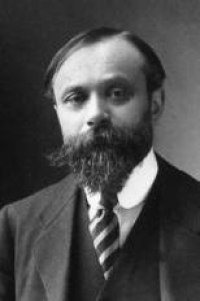Charles Tournemire
 Charles Tournemire (22 January 1870 – 3 or 4 November 1939) was a French composer and organist, notable partly for his improvisations, which were often rooted in the music of Gregorian chant. His compositions include many organ works, eight symphonies (one of them choral), four operas, twelve chamber works and eighteen for piano, but by far the best known piece from his pen is L'Orgue Mystique.
Charles Tournemire (22 January 1870 – 3 or 4 November 1939) was a French composer and organist, notable partly for his improvisations, which were often rooted in the music of Gregorian chant. His compositions include many organ works, eight symphonies (one of them choral), four operas, twelve chamber works and eighteen for piano, but by far the best known piece from his pen is L'Orgue Mystique.Tournemire was born at Bordeaux. He became one of César Franck's three youngest students (the others were Henri Büsser and a Belgian, Guillaume Lekeu).
From 1898 (on the resignation of Gabriel Pierné) to 1939, Tournemire served as the organiste titulaire at Franck's old church, the Basilique Ste-Clotilde, Paris. He was also professor of Chamber Music at the Paris Conservatoire, and teacher of organ improvisation there.
In 1930 Tournemire recorded five organ improvisations, which were later transcribed by Maurice Duruflé from phonograph recordings. Of ten 78-rpm discs which Tournemire made in 1930, playing the Aristide Cavaillé-Coll organ of Sainte-Clotilde (Polydor 561047, 561048, 566057, 566058, 566059), five contain music of Franck. This set of discs was awarded the Grand Prix du Disque on May 18, 1931.
Insofar as Tournemire's name is now remembered, it is usually spoken of in connection with his biggest composition: L'orgue Mystique, a group of 51 sets of five pieces each, all written between 1927 and 1932. This collection covers the cycle of the Roman Catholic liturgical year, each set being based on the Gregorian chants for the day. Unlike the symphonies of Charles-Marie Widor, L'Orgue Mystique was designed for church use, not for secular organ recitals.
Tournemire died at Arcachon in 1939. The exact cause of his death is uncertain, as is the exact date (3 or 4 November).
 Charles Tournemire Latest Sheets Feed
Charles Tournemire Latest Sheets Feed Charles Tournemire Latest Requests Feed
Charles Tournemire Latest Requests Feed
Advertisement
Advertisement


No request found!